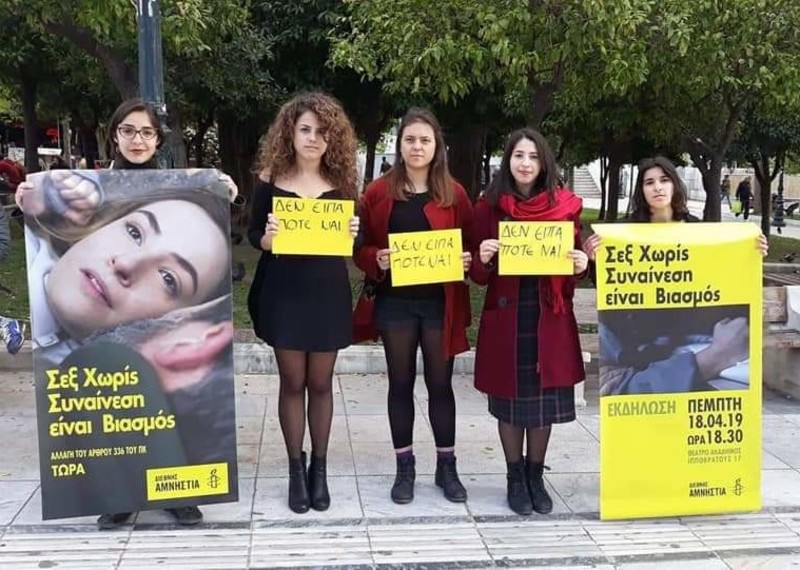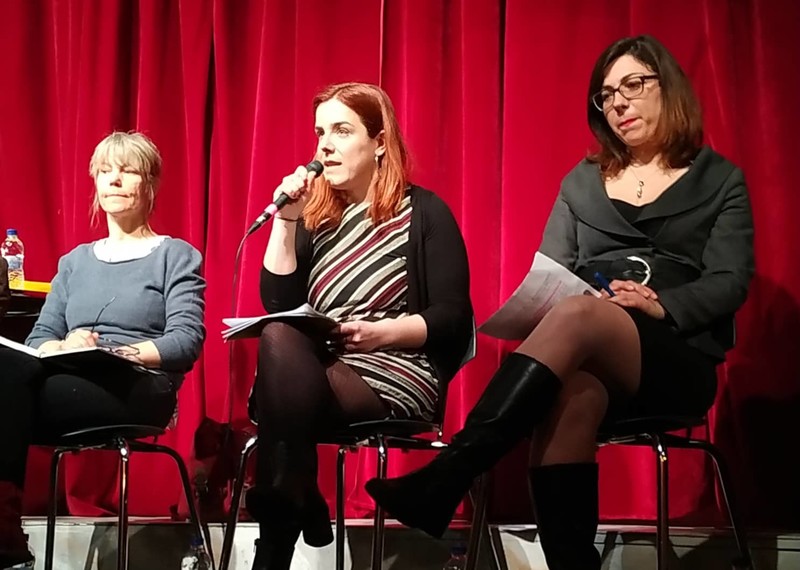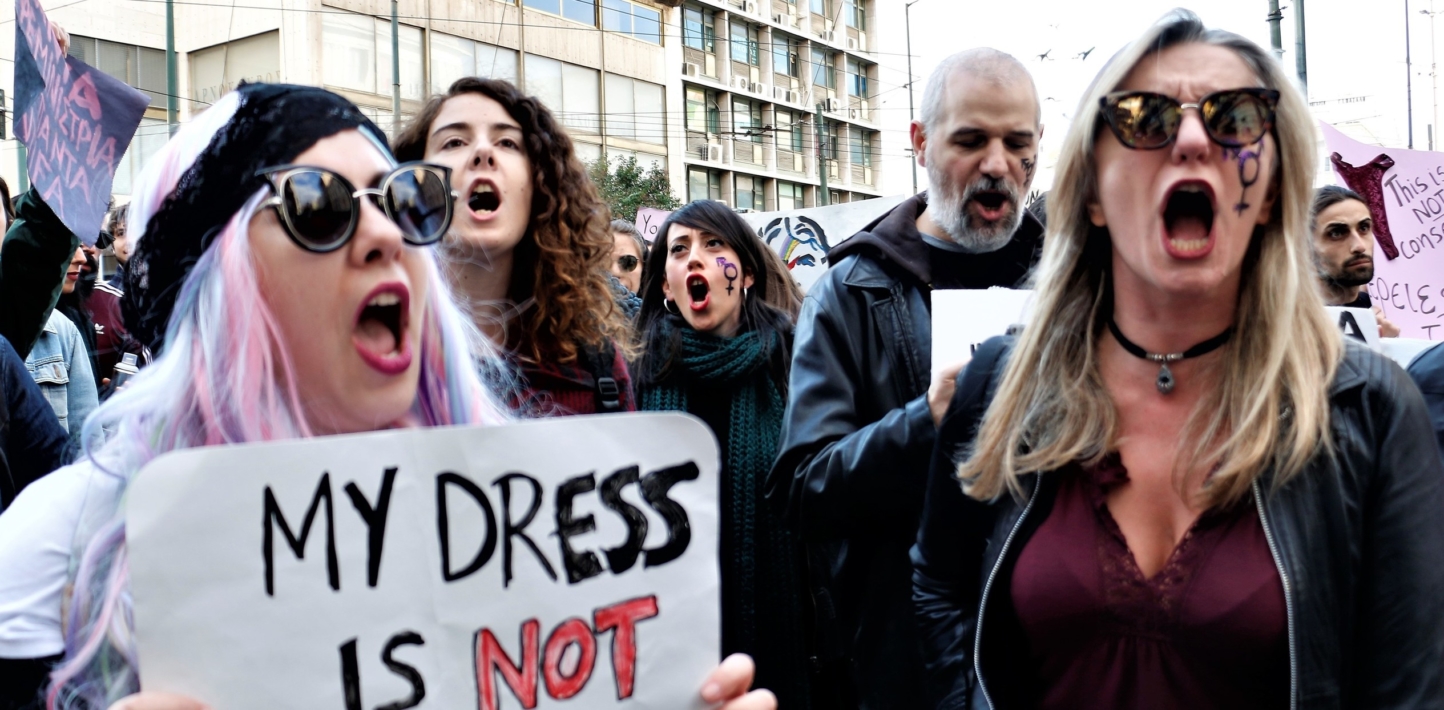Shockingly – until June 2019 – only 8 out of 31 countries in Europe analysed by Amnesty International recognised the simple truth in law that sex without consent is rape. Campaigners in Greece were determined to become the ninth. And in June, they did.
In countries that still don’t have consent-based rape laws, the legal definition of rape is not based on whether both parties consented to have sex, but by other factors, such as whether violence or the threat of force was used. But as we know, not all rapes happen this way.
Campaigners are working hard across Europe to see similar progress in their own countries. So here are 10 steps activists took in Greece to successfully bring about this crucial change.
STEP 1: State your demands
Dec 2017: Amnesty, in collaboration with women’s groups and NGOs, tells the Greek government to define sex without consent as rape in law, as Greece prepares to formally sign up to the Istanbul Convention on preventing violence against women.
STEP 2: Collaborate with others
Feb 2018: 10 NGOs including Amnesty International urge the Greek government to repeal the ‘marriage as settlement’ clause in law, which means that if someone has sex with a minor to whom they later get married, they cannot be prosecuted for rape.
STEP 3: Don’t accept half measures
March 2018: Greece formally ratifies the Istanbul Convention on preventing violence against women. The ‘marriage as settlement’ clause is repealed, but rape is still not defined as sex without consent. The campaign continues…
STEP 4: Do your research
Nov 2018: Amnesty International publishes a major report ‘The right to be free from rape’, giving an overview of the state of play regarding rape legislation and access to justice for rape across Europe.

STEP 5: Make some noise!
January 2019: Amnesty Greece launches its national #Let’sTalkAboutYes campaign calling for improved access to justice for rape victims, including through the adoption of a consent-based rape law. Amnesty Greece releases videos on sexual violence to demonstrate why consent-based rape law is essential.

STEP 6: Think outside the box!
Feb 2019: Amnesty partners with the National Opera of Greece and world-renowned ballet dancer and choreographer Nacho Duato to amplify the message on consent-based rape law.
STEP 7: Talk to those in power
February – June 2019: Amnesty sets up advocacy meetings with the Greek Minister of Justice and other key people in Government to put the case directly to them, and speaks to other interested organisations to present a united and stronger case for change.
March 2019: Amnesty makes a submission on the legal definition of rape as the Greek government launches a consultation on reform of the Criminal Code. This is coupled with a press conference on the submission and work to reach out to the UN Working Group on the issue of discrimination against women in law and in practice.
STEP 8: Hold events
April 2018: Amnesty holds an event in Athens where people can learn more from a panel of experts. Other events such as musical/theatrical, student and activist events in Athens and other cities are well attended and help to spread the word and attract more support for the cause.

STEP 9: Generate public debate
Campaigners generate great media interest and public debate, with almost universal support. A question by 55 out of 300 MPs is officially submitted in Parliament asking the Minister for change, the campaign connects into International Women’s Day, amplifying the message, and large networks are formed campaigning for change, including an assembly formed by women’s organisations called Without Consent It’s Rape.
Amnesty’s campaign in Greece also ties into other campaigns taking place in Denmark, Finland and other countries, giving a regional perspective on justice for rape in Europe.
STEP 10: Don’t take no for an answer!
June 2019: Just before a snap election, the Ministry of Justice announces a proposal to amend rape law, which is not compatible with international human rights law and not in line with the calls of campaigners. Amnesty issues a strong statement condemning this proposal, whilst women’s organisations simultaneously mobilise and set up a protest outside Parliament, also criticising the proposal in the media. The outrage is picked up by international media, spreading the message further.
The following day, following Amnesty’s intense advocacy, the Minister of Justice does a U-turn and amends the proposed reform so that sex without consent is criminalised as rape. Parliament votes to change the definition of rape in law. Now sex without consent is rape in Greek law.
We are at a tipping point when it comes to justice for rape survivors in Europe. The same change has taken place already in other European countries, with Greece being the ninth to introduce a consent-based rape law after Iceland and Sweden in 2018. Following years of campaigning, other countries, such as Denmark, Finland and Spain, are on the brink of introducing consent-based laws too.
Adopting consent-based laws will not stop rapes occurring, but it is an important step towards changing attitudes and achieving justice for survivors. Laws guide people’s attitudes and behaviour, so they must make it clear that sex without consent is rape.
As we have seen in Greece, change can happen, so don’t give up! Let’s Talk About Yes!


